Student READY Programme
The Student READY (Rural
Entrepreneurship Awareness Development Yojana) programme aims to
provide rural entrepreneurship awareness, practical experience in
real-life situation in rural agriculture and creating awareness to
undergraduate students about practical agriculture and allied
sciences.
To reorient graduates of
agriculture and allied subjects for ensuring and assuring
employability and develop entrepreneurs for emerging knowledge
intensive agriculture, the
component envisages the introduction of the programme as an essential
prerequisite for the award of degree to ensure hands on experience
and practical training.
B.Sc. (Hons.) Agriculture
The students will undertake student READY program during the seventh semester for a total duration of 20 weeks with a weightage of 0+20
credit hours in two parts
Rural
Agricultural Work Experience (RAWE)&
In-Plant Training/Agro Industrial Attachment (AIA)
It will consist of general orientation and on campus training by different faculties followed by village attachment/unit attachment in University/ College/ KVK
or a research station. The students would be attached with the agro-industries to get an experience of the industrial environment and working.
Due weightage in terms of credit hours, will be given depending upon the duration of stay of students in villages/agro-industries.
At the end of RAWE & AIA, the students will be given one week for project report preparation, presentation and evaluation.
The students would be required to record their observations in field and agro-industries on daily basis and will prepare their project
report based on these observations.
Component-
I
Rural Agricultural Work Experience (RAWE) Credits: 16 (0+16)
Objectives
To
provide an opportunity to the students to understand the rural
setting in relation to agriculture and allied activities.
To
make the students familiar with socio-economic conditions of the
farmers and their problems.
To
impart diagnostic and remedial knowledge to the students relevant to
real field situations through practical training.
To
develop communication skills in students using extension teaching
methods in transfer of technology.
To
develop confidence and competence to solve agricultural problems.
To
acquaint students with on-going extension and rural development
programmes.
Component-
II
Agro-Industrial
Attachment (AIA) Credits:4 (0+4)
Technology
and globalization are ushering an era of unprecedented change. The
need and pressure for change and innovation is immense. To
enrich the practical knowledge of the students, in-plant training
shall be mandatory in the last semester for a period of up to 3
weeks. In this training, students will have to study a problem in
industrial perspective and submit the reports to the college. Such
in-plant trainings will provide an industrial exposure to the
students as well as to develop their career in the high tech
industrial requirements.In-Planttraining is meant to correlate
theory and actual practices in the industries. It is expected
that sense of running an industry may bearticulated in right way
through this type of industrial attachment
mode.
Objectives
To
expose the students to Industrial environment, this cannot be
simulated in the university.
To
familiarize the students with various Materials, Machines,
Processes, Products and their applications along with relevant
aspects of shop management.
To
make the students understand the psychology of the workers, and
approach to problems along with the practices followed at factory
To
understand the scope, functions and job responsibilities in various
departments of an organization.
To
expose various aspects of entrepreneurship during the programme
period.
Rural Agricultural Work Experience (RAWE) & Agro Industrial Attachment (AIA)
|
No.
|
Activity
|
Credit(s)
|
Maximum Marks
|
|
Component - I
Rural Agricultural Work Experience (RAWE)
|
|
1
|
Survey
of Village
|
0+1
|
50
|
|
2
|
Agronomical
Interventions
|
0+3
|
50
|
|
3
|
Plant
Protection Interventions
|
0+2
|
50
|
|
4
|
Soil
Improvement Interventions(Soil sampling and testing)
|
0+2
|
50
|
|
5
|
Fruit
and Vegetable production interventions
|
0+3
|
50
|
|
6
|
Food Processing and Storage interventions
|
0+1
|
50
|
|
7
|
Animal
Production Interventions
|
0+1
|
50
|
|
8
|
Extension
and Transfer of Technology activities
|
0+3
|
50
|
|
Component - II
Agro-Industrial Attachment (AIA)
|
|
9
|
Agro-Industrial
Attachment
|
0+4
|
50
|
|
Total
|
0+20
|
450
|
B.Sc. (Hons.) Horticulture
The students of B.Sc. (Hons.) Hort. will undertake student READY program during the seventh semester for a total duration of 24weeks
with a weightage of 0+20 credit hours in two parts:
It will consist of general orientation and on campus training by different faculties followed by village
attachment/unit attachment in University/ College/ KVK or a research station.
The students would be attached with the horti-industries to get an experience of
the industrial environment and working. Due weightage in terms of credit hours will be given
depending upon the duration of stay of students in villages/horti-industries.
At the end of RHWE &HIA, the students will be given one week for project report preparation,
presentation and evaluation. The students would be required to record their observations in
field and horti-industries on daily basis and will prepare their project report based on these observations.
Component-I
Rural Horticultural Work Experience (RHWE) Credits: 10 (0+10)
To provide an opportunity to the students to understand the rural setting in relation to horticulture
and allied activities (village settlement pattern, demography, land utilization pattern, resources inventory,
infrastructural facilities, rural institutions, organizations, groups, customs, beliefs and value system etc.).
To make the students familiar with socio-economic conditions of the farmers and their problems.
To impart diagnostic and remedial knowledge to the students relevant to real field situations through practical training.
To study the cropping pattern, extent of adoption of latest technologies and identify the constraints in horticultural crops.
To develop communication skills in students using extension teaching methods in transfer of technology.
To develop confidence and competence to solve horticultural problems.
To
acquaint students with on-going extension and rural development
programmes.
Component-II
Horti-Industrial Attachment (HIA) Credits: 10 (0+10)
Technology and globalization are ushering an era of unprecedented change. The need and pressure for change
and innovation is immense. To enrich the practical knowledge of the students, in-plant training shall be mandatory
in the second last semester for a period of up to 12 weeks inclusive of report preparation, presentation and evaluation etc.
In this training, students will have to study a problem in industrial perspective and submit the reports to the college.
Such in-plant trainings will provide an industrial exposure to the students as well as to develop their career in the high
tech industrial requirements. In-Plant training is meant to correlate theory and actual practices in the industries.
It is expected that sense of running an industry may be articulated in right way through this type of industrial attachment mode.
Objective
To expose the students to Industrial environment, this cannot be simulated in the university.
To familiarize the students with various Materials, Machines, Processes, Products and their applications along with
relevant aspects of industry management and constraints faced by an industry.
To make the students understand the psychology of the workers, and approach to problems along with
the practices followed at industry.
To understand the scope, functions and job responsibilities in various departments of an organization.
To expose various aspects of entrepreneurship during the programme period.
Rural Horticulture Work Experience (RHWE) & Horti-Industrial Attachment (HIA)
|
S.N.
|
Activity
|
Credit(s)
|
Maximum Marks
|
|
Component - I
Rural Horticulture Work Experience (RHWE)
|
|
1
|
Survey
of Village
|
0+1
|
50
|
|
2
|
Horticultural Interventions
- Fruit production
- Vegetable Production
- Commercial Floriculture
- Spices, medicinal and aromatic crops
- Post harvest technology and value addition
|
0+5
|
50
|
|
3
|
Soil Improvement Interventions (Soil sampling and testing)
|
0+1
|
50
|
|
4
|
Plant Protection Interventions (Entomology & Plant Pathology)
|
0+2
|
50
|
|
5
|
Extension and Transfer of Technology Activities
|
0+1
|
50
|
Component - II Horti-Industrial Attachment (HIA)
|
|
6
|
Horti-Industrial Attachment
|
0+10
|
200
|
|
Total
|
0+20
|
450
|
The Vishwa Vidhyalaya has prepared manual for RAWE/AIA/ and RHWE/HIA, which guide the students and
teachers in achieving exquisite objective of the programme. The manual is revised regularly because of
the changing cropping pattern as well as meeting the revised curriculum of ICAR.
B.Sc. (Hons.) Forestry
Work Experience (FWE and Industrial Attachment)
FWE is a 120 days training programme as an essential degree requirement under new course curriculum.
In this programme the students are placed in village as well as forest department for intensive work in forestry sector.
During the training programme the student will study the situation of socio-economic components of rural life,
through rural participation and forest management.
Objectives of FWE:
To develop an understanding of forest and rural life in different situations prevailing in a village/cluster of small village.
To understand socio-economic and institutional aspects of village ecosystem
To provide an opportunity for practical training in forestry activities through work experience.
To develop communication skills in “Transfer of Technology”.
To understand forestry including agro-forestry technologies adopted by local farmers and forestry related organizations/ enterprises and to prepare
forestry management plans specific to site in consolation with the village and forestry related professions.
Components of FWE
| S.No |
Components |
Days |
Credits |
| 1.
|
Orientation
|
10
|
0+1
|
| 2.
|
Forest Range Training Programme
|
50
|
0+12
|
| 3.
|
Industrial Placement
|
20
|
0+3
|
| 4.
|
Weapon Training and First Aid Training
|
5+3=8
|
0+1
|
| 5.
|
Socio-economic Surveys and Village Attachment
|
20
|
0+2
|
| 6.
|
Report writing and Presentation
|
12
|
0+1
|
|
Total
|
120 |
0+20 |

REPORTS SUBMITTED BY RAWE STUDENTS
Status of RAWE/ RHWE/ FWE (2020-21 to 2022-23)
| Year/Programme |
2020-21 |
2021-22 |
2022-23 |
Total |
| Boys |
Girls |
Boys |
Girls |
Boys |
Girls |
| B.Sc. (Hons.) Agriculture |
269 |
141 |
278 |
145 |
329 |
166 |
1328 |
| B.Sc. (Hons.) Forestry |
11 |
7 |
10 |
9 |
14 |
11 |
62 |
| B.Sc. (Hons.) Horticulture |
-- |
-- |
54 |
14 |
73 |
32 |
173 |
| Total |
280 |
148 |
342 |
168 |
416 |
209 |
1563 |
Glimpses of RAWE/FEW/AIA

Seed treatment of paddy seeds
|

Seed treatment of Gram Seeds
|
>

Preparation of seedling in tray
|
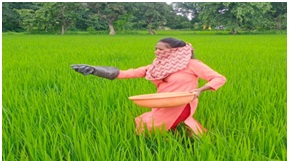 Fertilizers application in paddy field
Fertilizers application in paddy field
|

Preparation of field by bakhar
|

Sowing of paddy seeds in nuresery field
|
 Uprooting of paddy seedlings
Uprooting of paddy seedlings
|
 Transplanting of paddy crop
Transplanting of paddy crop
|

|

|

Transplantig of Rice
|

Hand weeding in Rice crop
|

|

Harvesting
|

Mushroom Demonstrations
|

Spawn production at Mushroom Unit Bags Preparation
|
AGRO-INDUSTRIAL ATTACHMENT
|
 Govt. Horticulture Nurser, Sanchi, Raisen Govt. Horticulture Nurser, Sanchi, Raisen
|
 Maa Bhawani Gud Ghana Crusher Udyog, Betul Maa Bhawani Gud Ghana Crusher Udyog, Betul
|
|
 Training in tusser reeling centre, Waraseoni Training in tusser reeling centre, Waraseoni
|
 Training in ruchi biochemical on production Training in ruchi biochemical on production
|
|

|

|
Training in silk production unit, Mandla |
FOREST WORK EXPERIENCE & INDUSTRIAL ATTACHMENT
|

|
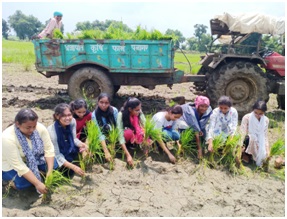
|
|
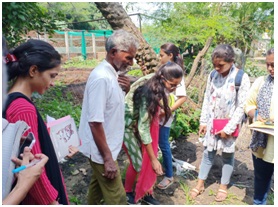
|
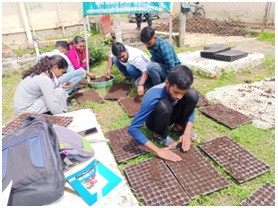
|
|

|
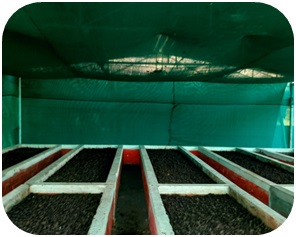
|
|
Movable and Immovable Vermi-compost bed preparartion
|